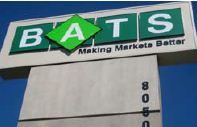(Bloomberg) — Bats Global Markets Inc., which vies with NYSE Group for the title of biggest U.S. stock exchange operator, says it knows how to improve the market for thinly traded shares: Stop handling them.
The exchange wants to back away from lightly traded companies listed by the New York Stock Exchange or Nasdaq Stock Market. The plan would concentrate liquidity at the NYSE and Nasdaq, potentially making the stocks easier to buy and sell.

The proposal, which the U.S. Securities and Exchange Commission has to approve, would enable market participants to more efficiently form prices, according to a letter Thursday to customers from Chris Concannon, who just became the chief executive officer of Lenexa, Kansas-based Bats. One venue also will be better able to innovate their markets specifically for thinly traded stocks.
An exchange could increase volume by holding midday auctions, changing the price increments or amending market-maker standards, Concannon said during an interview. The change would affect 500 to 600 stocks, he said, adding that while the proposal wont meaningfully sway the finances of Bats, it should help improve the overall market.
U.S. stock trading is distributed across 11 exchanges — including three run by NYSE Group, three at Nasdaq, and four at Bats — and dozens of alternative venues. Stocks can in theory trade on any of those venues at any time. The Bats proposal would keep lightly traded companies off its four exchanges. Unlike the NYSE and Nasdaq, Bats doesnt offer corporate listings.
Bats has recently weighed in on other ways to improve stock trading. In January it published a letter suggesting a reduction in exchange fees for some securities depending on the amount of volume. It also said there should be a review of how brokers report where they send orders and what standards they use in making those decisions.



